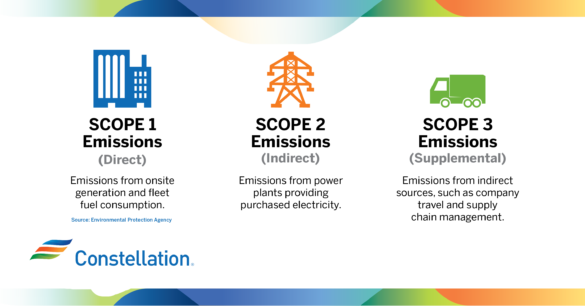Setting Sustainability Goals and Meeting Them with Reduction Targets
Government entities and institutional investors are increasingly applying pressure on public companies to address climate change.
As additional scrutiny is placed on emissions and supply chain management, many companies have established aspirational goals to improve environmental, social and governance (ESG) metrics, although some lack detailed plans on how to achieve their goals. Constellation can deliver value and expertise in this area by helping customer set attainable milestones and understand the critical areas to target for improvement.
“Energy managers are looking for their competitive energy suppliers to engage customers not only as ‘electricity consumers’ but as allies on a sustainable mission,” says Raj Bazaj, Constellation’s Vice President of Customer Solutions.
To comply with statewide and national clean energy regulations and global initiatives, and to be recognized as leaders in sustainability, more businesses are proactively measuring and reporting their greenhouse gas emissions (GHG) and setting targets to reduce them.
Understanding Your Business’ GHG Footprint
Businesses have the opportunity to influence the sources of their emissions in three distinct ways. They might include:1
- Scope 1 emissions from onsite generation and fleet fuel consumption
- Scope 2 emissions from power plants providing purchased electricity
- Scope 3 emissions from indirect sources, such as supply chain management and company travel

Because sources of emissions are boundless, many organizations struggle to grasp their true energy footprint. As a result, businesses are turning to new technologies to uncover areas of opportunity within their facilities and operations.
There are many ways energy managers can manage their utility data. The Constellation Navigator Utility Bill Management Platform, which is an energy intelligence platform, makes it easy for them to manage and understand their energy footprint. In-house data collection, combined with machine learning and reporting, give meaning to the data and identify optimal opportunities for efficiency, demand reduction and potential cost savings – which can be a first step towards creating a sustainability plan.
Creating Reduction Targets
After establishing a baseline and finding areas of opportunity such as implementing renewable energy purchases to decrease fossil fuel use or making the switch to energy-efficient LED lighting to reduce energy consumption, businesses can create attainable greenhouse gas (GHG) reduction targets with the help of Constellation.
GHG reductions targets are emission reduction levels that entities set out to achieve by a specified time, according to the Center for Climate and Energy Solutions.2 Setting targets can drive a business’ commitment to achieve its sustainability goals.
Common reduction targets might include:
1. Absolute reduction goals (e.g., 80% reduction below 2005 levels by 2030.)
This can refer to a goal of baseline emissions being reduced by a certain percentage by a certain end year. Businesses may focus on market-based (i.e., energy efficiency and clean attribute purchases) or location-based accounting (i.e., energy efficiency or onsite renewables).
2. Science-based targets
An example of a science-based target is a well-below 2-degree Celsius target. This is based on the internationally agreed upon threshold of well-below 2-degree Celsius temperatures, representing the measure beyond which significant climatic changes would occur and be disruptive to earth’s systems that are currently relied on to meet basic societal needs. Corporate goals are vetted against the required reductions for their sector under this methodology and are encouraged to be achieved by 2050.
Customers can look to technologies like Measurabl, a startup funded by Constellation Technology Ventures, the venture investing arm within Constellation, to keep track of their data and monitor the progression of their actions to reduce carbon emissions from start to finish. Measurabl is a cloud-based software that collects data, creates investment-grade sustainability reports and identifies improvement opportunities.
Businesses that implement aggressive sustainability goals can reduce emissions and energy costs, help address climate change and attract ESG-focused customers and investors.
Contact your Constellation sales representative to learn more about sustainability strategies and helpful technologies to support your business’ goals. To receive similar content on a bimonthly basis, subscribe to our emails via www.constellation.com/subscribe.
Learn more about sector-specific goals.
* Based on current World Resources Institute (WRI) guidance. Scope 2 reporting claims of this product may be affected by future changes





![[Video] About Constellation, Leading Carbon-Free Energy Producer](https://energy.constellation.com/wp-content/uploads/2022/05/city_thm-435x290.jpg)













